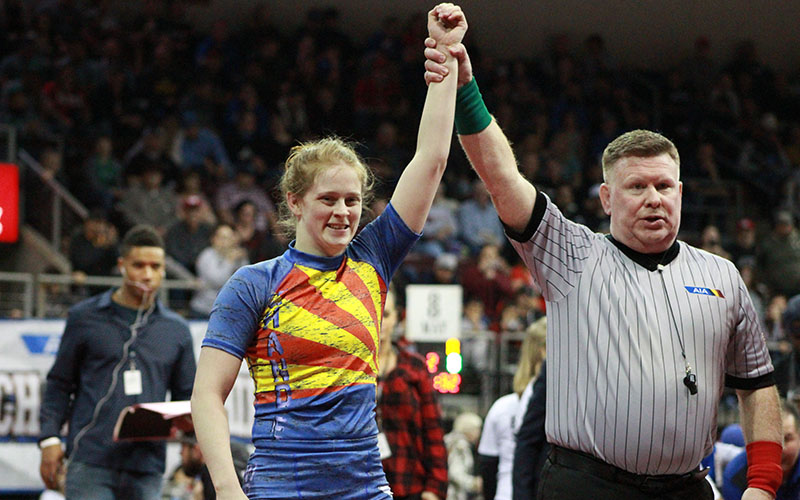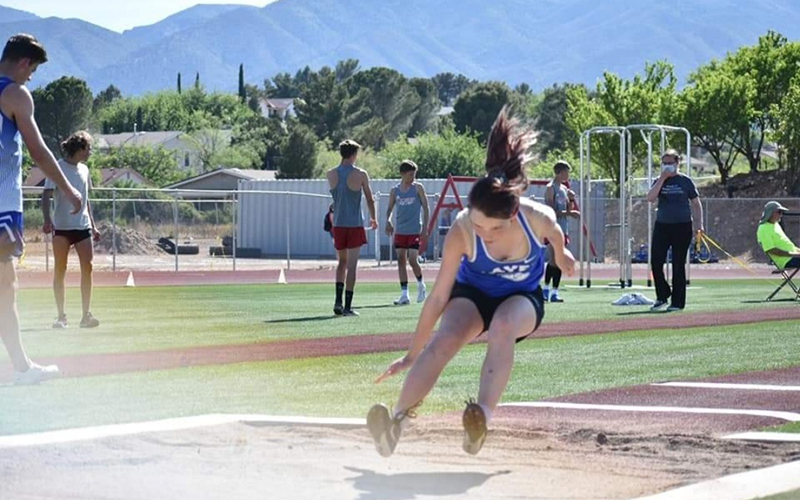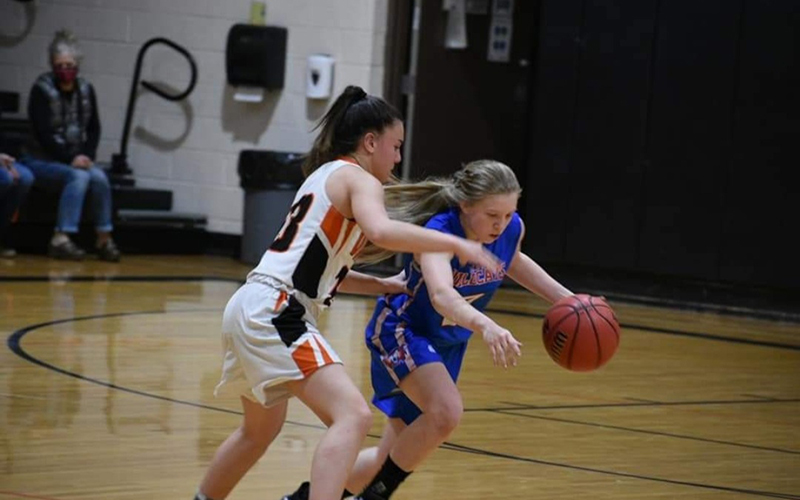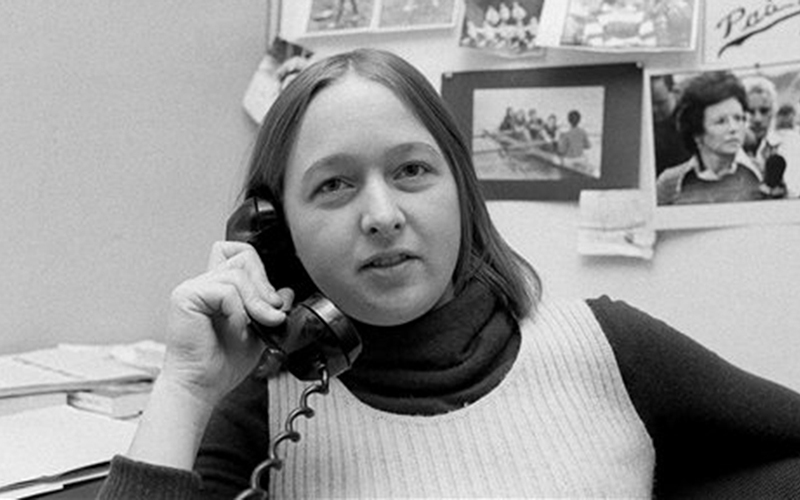
Parents can help girls stay in sports by encouraging them, even in nontraditional female sports like wrestling. (File photo by Serina Perez/Cronkite News)

Danielle McCann’s parents attend as many of her athletic events as they can, from track to volleyball to basketball. (Photo courtesy of Michele McCann)
PHOENIX – Michele McCann says she has “loud mom syndrome.”
At all of her three daughters’ games, she can be heard cheering for not only her children, but everyone on the team.
“I’m the loud mom in the crowd,” she said. “I’ve always been very determined to make sure that they know that they’re appreciated and there is at least one parent that’s extremely proud of them and loves watching them grow.”
Experts see value in her enthusiasm. A 2020 Women’s Sports Foundation study found that parental support has a significant impact on whether girls stay in sports in a way it doesn’t for boys. Additionally, by 14, girls drop out of sports at two times the rate of boys.
McCann and her husband, Tye, live with their daughters in Cordes Lakes, just an hour north on the I-17 from Phoenix. Senior Kylie, sophomore Danielle and eighth-grader Taylor play volleyball in the fall, basketball in the winter and softball and track in the spring. The high schoolers also play basketball over the summer.
McCann attends every practice and game she can. If she can’t travel to away games, she calls often to check in. She quit playing sports in high school because she wasn’t supported.
“My parents didn’t back me,” McCann said. “They weren’t there when I played sports, and it broke my heart. So I determined that I was not going to do that for my daughters. I was going to be everywhere they needed me.”
Nicole Zarrett, an associate professor of psychology at the University of South Carolina who co-authored the Women’s Sports Foundation study, said more girls drop out because playing sports are inherent in the way boys are raised. If parental support is minimal they have media celebrating boys in sports, supportive peer groups, role models on TV, and video games designed to show them they belong. For girls, those external resources are fewer.
“We’re looking at parenting being particularly important for girls because it may be the only resource they have in supporting their entrance and continuation,” Zarrett said.
Along with a lack of resources, girls face stereotypes that contribute to them leaving athletics. The study found that 32.2% of parents endorsed the belief that boys are better at sports than girls.
Phil Veliz, an associate research professor at the University of Michigan’s School of Nursing and co-author of the study, said along with that stereotype comes the assumption that girls will gravitate toward other extracurricular activities or focus on academics whereas boys are expected to play a sport even if they have other interests. However, Veliz said data shows their interest level is the same, making it important for parents to be sure their daughters have the opportunity to try different sports.

Kyle McCann and her sisters play sports year-round, with basketball being one of many. Experts say having role models can help maintain participation. (Photo courtesy of Michele McCann)
Another way parents can help offset harmful norms is by simply encouraging their daughters. During the course of the study, Zarrett, Veliz and their investigative partners surveyed parents and children, finding girls were often teased by their peers in athletic spaces whereas boys were supported and encouraged. Zarrett said parents can help by providing their daughters a support system.
“For parents it’s showing your daughter that you believe in their abilities, that they’re capable,” she explained.
McCann started her two oldest daughters off with a Little Dribblers youth basketball program when they entered kindergarten. McCann recalled that her daughters were the only girls in their age group. The boys in the program, and some of their parents, weren’t always receptive. She said her daughters received comments like, “What are you doing here?” and “Go take ballet.”
Now, they often are asked why they bother to play basketball because they’re not tall. McCann’s daughters don’t let those questions deter them.
“They’re inspirational to me in that sense,” McCann said. “They’re not allowing anyone to tell them what they can and can’t do. They’re going to do it.”
Inspiration is another factor parents can provide to help encourage their daughters to keep playing sports. The Women’s Sports Foundation study found that only 12% of parents whose children dropped out of sports encouraged their children to follow sports figures in media and only 26% of them reported taking their children to watch sporting events. Those opportunities were also disproportionately provided to youth in middle-to-higher income households and boys.
Those statistics speak to the role-model gap girls experience when it comes to sports. It’s important for parents to provide role models for their daughters by finding women’s athletic events on TV or locally, Zarrett said. It can even be as simple as helping them follow women’s athletics on social media or playing catch with them in the yard.
Paige Tonz, a girl athlete mindset mentor based in Phoenix, works with girls who are frustrated or struggling with disappointment in sports to help them enjoy the game and deal with their mistakes in a healthy way.
She played softball at Northwestern. In her childhood, she didn’t have many softball players to look up to, though her parents did take her to Arizona State and University of Arizona games. Now, her clients find role models more easily in televised games and on social media. One of the girls she works with in Pennsylvania is obsessed with Aliyah Andrews who plays for LSU, something Tonz believes wouldn’t have been possible when she was growing up.
Increased TV exposure of women’s sports is great for girls though there’s still more to be done to achieve equity, Zarrett said. Veliz added that seeing women in roles such as coaching or officiating is also important to keep girls involved in sports. Seeing there are other ways to be involved can help girls who love sports but aren’t as athletically gifted stick around, too.
The McCann family yard is full of sporting equipment. One of Michele’s most memorable experiences as a parent was taking her daughters to a Harlem Globetrotters game. There, Kylie met TNT’s Lister, who was the first woman to be a Globetrotter since 1993.
“Seeing female athletes excel … has opened my daughter’s eyes,” McCann said. “Anything’s possible.”
For parents like McCann who want to make sure their daughters stick with sports, fun is the key. According to the study, maintaining a love of sport was one of the most important factors for girls who stayed in the game.
Veliz believes not having children specialize in one sport is a way parents can ensure that love sticks around. Because only a small percentage will become a college or professional athlete, Veliz thinks greater benefits come from playing many sports for fun rather than one sport to be the best.
He recommends leagues outside schools but noted those aren’t always available to households with lower incomes. He also said not taking it too seriously can help keep girls enjoying sports.
Tonz agreed, saying many parents come to her because their daughters are struggling with feeling like a failure and need encouragement to keep going. Her clients often have a fear of disappointing parents or teammates, so parents making it clear that fun is the goal can help.
Tonz teaches the girls she mentors to try to learn from their mistakes instead of dwelling on them.
McCann uses that mindset to help her daughters when they’re upset after losing a big game.
“If they continue standing up, continue getting on the horse and continue pushing, then it’ll never be a failure. It’ll be a lesson that they have learned,” she said.
Veliz said it’s important for parents to help their daughters keep playing sports because of those lessons. Encouraging them to look past their mistakes to focus on the enjoyment and growth will help them stay in sports and prepare them for life.
“That’s why sports are so important because you learn that kind of resilience,” he said. “In order to get better, you have to practice. That’s pretty much anything in life. If you want to get better at it, you have to do it over and over and over again.”
For McCann, her ultimate goal is for her daughters to know she will support them in anything they try, even if it isn’t sports.
“I think it’s just the matter of having people there on your side,” she said. “That is most important regardless of what you’re doing, sports, academics, FFA, anything else. … It’s having people in your corner.”

